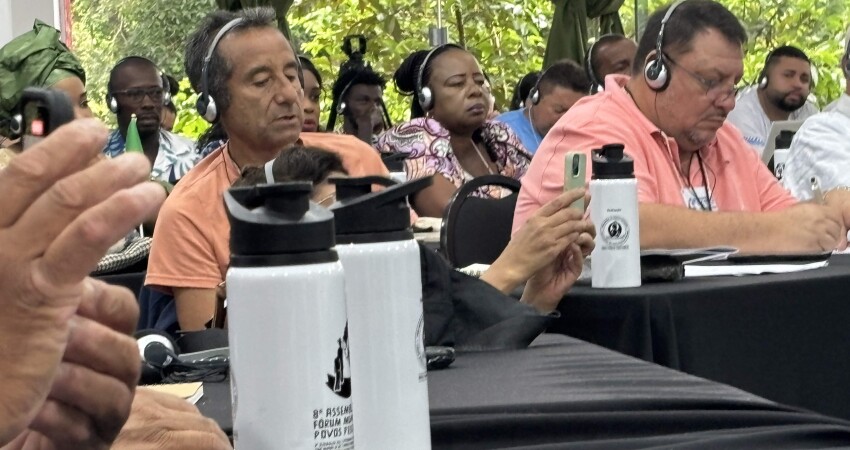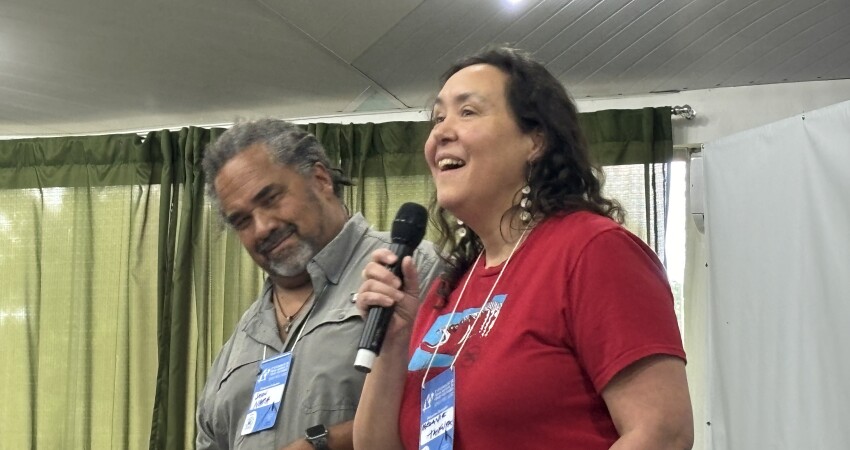From Nov. 14 to World Fisheries Day on Nov. 21, over 100 fisher folk and their representatives from around the world gathered in Brasília, Brazil, for the 8th General Assembly of the World Forum of Fishing Peoples (WFFP). The conference aimed to develop strategies for confronting many of the issues that small-scale fisheries face – everything from wind farms and marine protected areas to coastal development, and ocean privatization through aquaculture.
Bristol Bay setnetter Melanie Brown and Rhode Island fisherman and clammer Jason Jarvis represented the U.S., joining other small-scale fishing people from countries in Africa, Asia, Europe, South America, and Central America, as well as island nations of the Pacific Ocean and the Caribbean Sea.
In sessions dealing with forms of so-called ocean “grabbing” – or appropriation of ocean resources by other interests – climate change and other topics, Brown and Jarvis shared their perspectives, citing issues like the ongoing battle with Pebble Mine in Bristol Bay and the proposed Donlin Gold Project near the Kuskokwim River.
“We know from experience right here in Brazil what impact mine tailings can have on fisheries,” Brown said, referring to the 2015 and 2019 disasters in Brazil, when tailings dams broke, killing hundreds and damaging farms and fisheries for years. “And the Donlin mine is in the southwest Alaska mercury belt, so digging that up will inevitably release that mercury into the water, air, and onto the land.” Brown also talked about climate change and its effects on the marine food chain, leading to seabird die-offs and smaller-sized salmon returning from the North Pacific.
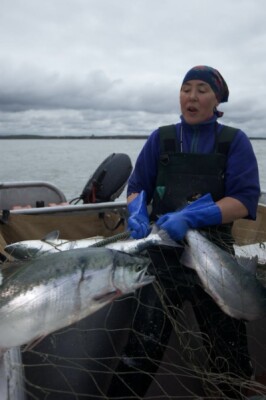
Coming from the U.S. East Coast, Jason Jarvis discussed the impacts of catch shares, which privatized New England fisheries in 2011.
“If these NGOs (non-governmental organizations) come to you promising to protect your fisheries by implementing quota systems, don’t do it,” Jarvis told the international gathering. “It turns fish into a commodity that you have to buy rights to. For example, and this is outside New England, our friends in Louisiana have to buy quota for red snapper. They pay $4 for a pound of quota and get paid $4.50 for the fish they catch. So, they do all that work for 50 cents a pound.”
Jarvis also told the assembly about the impacts of wind farms on marine ecosystems and fishing communities. “The squid fishery tanked this year,” he said. “And science is showing that it’s the impacts of the wind farms.”
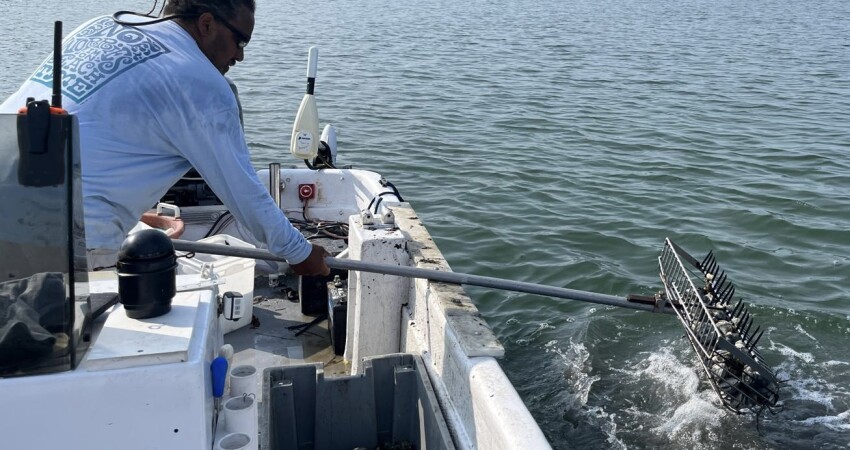
In The New Scientist in 2021, Joshua Rapp Learn reported that “construction of offshore wind turbines can discourage squid from hunting, which could lead to decreased squid populations and potentially decrease profits in fisheries. Securing offshore wind turbines to the seabed involves pile-driving that causes intense continuous noise for up to three years during construction.”
In another journal, Oceanography, Woods Hole Oceanographic Institute researcher T. Aran Mooney and his co-authors reported wind farm construction impacts on squid. “The longfin squid shows significant changes in feeding, with a reduction in capture rates and higher failed predation events, and in general behavior, such as increased inking, jetting, startle responses, and body pattern alterations (visual communication), in response to exposure to replayed pile-driving noise from OWF construction,” Mooney and his team wrote in their paper: Acoustic Impacts of Offshore Wind Energy on Fishery Resources: An Evolving Source and Varied Effects Across a Wind Farm’s Lifetime.
“And in terms of space, they already have a lease map for the Gulf of Maine,” Jarvis said, shaking his head in disgust.
New England fishermen have already seen one wind turbine break apart on the Vineyard Wind project, littering beaches with shards of fiberglass. The assembled fishing people shared other stories of problems they see with wind farms. One attendee noted that in the nearby Amazon basin, balsa trees are being logged at an unsustainable rate and used to make blades for the windmills.
Wind farms represent just one form of ocean grabbing, forum participants said. Representatives from Indonesia described how seafloor mining destroyed essential fish habitat, and Daouda Ndiaye, co-chair of the WFFP, recounted how the oil and gas industry was impacting fisheries in his native Senegal.
Aquaculture stood out as one of the most pervasive forms of displacing fishermen, particularly in the tropics where shrimp farms replace fishing communities. Azrilnizam Omar, from the Malaysia Small Scale Fisheries Network talked about how his country’s government and businesses are promoting aquaculture as an option for young people, ignoring that aquaculture leases can last for decades and be easily renewed, essentially privatizing the ocean commons. In fishing communities with limited resources, he noted, young people have little choice but to get into aquaculture.
Similar programs have been launched in the U.S., with seaweed farming being promoted in high schools as a way to grow food. These programs seldom mention the U.S. Department of Energy’s concept of growing 18 million acres of marine algae off the U.S. coast for biofuel and chemical production.
Fishing people also face a loss of territory on land, participants said. As many fishermen in popular tourist destinations can confirm, coastal development leads to loss of access to the sea. Many in attendance related stories of their governments giving permits to entrepreneurs to build hotels that close traditional fishing beaches. “We are faced with an influx of strangers, and all the social evils they bring,” said Andre Cloete of South Africa.
Fishing people from the global south told stories of threats to their lives as they confront ocean grabbing. In India, past protests against shrimp farms have led to participants being shot dead.
In places like Maine, where commercial fishing and the seafood industry account for 4 percent of the gross domestic product, U.S. fishermen are seeing other threats to their way of life. The Maine Coast Fishermen’s Association posted an article by Monica Coombs, the group’s director of marine programs, on the gentrification of the state’s working waterfront and coastal communities. Coombs wrote that an influx of new residents seeking to avoid the covid-19 pandemic raised property values and led to conflicts with new shorefront property owners, who have sought to close traditional access points for fishermen.
“In all these cases, the common theme is a transformation in the use, ownership, or development of the spaces that impacts the existing community, potentially leading to displacement, changes in accessibility, and shifts in the character of the area,” Coombs wrote.
Fishermen in the U.S. have some guaranteed public access in urban ports and dominate many harbors in the Pacific Northwest, Downeast Maine, and along the Gulf Coast. But for small scale fishermen operating out of outboard skiffs in developing countries hungry for foreign investment, losing an access point can break them.
The one universal issue that appears to be affecting all the fishing people in attendance and their communities is climate change. “It’s real,” said Adam Manik, deputy director general of Fisheries and Ocean Resources in the Maldives, an island country in the Indian Ocean. Manik notes that the highest point above sea level in his country is 17 feet above sea level. “We are seeing sea level rise and coral bleaching, all of that.”
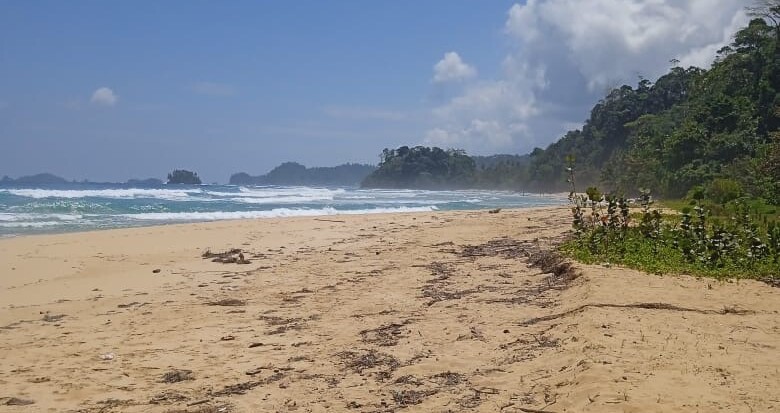
As has been seen in the Bering Sea, the Gulf of Maine and many other fishing grounds, species concentrations and migration patterns appear to be changing due to warming ocean temperatures. In the Maldives, tuna stocks are reported to be moving further offshore. “We fish for tuna using hooks,” said Manik. “We are building bigger boats for tuna, with freezers.”
Aricelly Jiménez Mora attended the WFFP conference and described how she operates her 20-foot (6-meter) panga out of Chomes Puntarenas in Costa Rica, shrimping, fishing, and clamming.
She has done well most of her life, but researchers say warming waters are affecting the country’s artisanal fisheries, and Mora is unsure about the future. “Our catches are going down. I started with my own boat when I was 23. I’m 38 now, and I don’t know how long I will be able to continue fishing.”
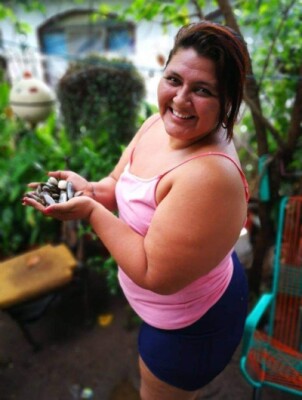
Strategies for dealing with all the myriad challenges fishing people face around the world range from adapting fisheries strategies and gear, and sometimes vessel design to adapt to environmental and regulatory changes, as well as loss of space. Some fishermen in Somalia have resorted to piracy. The most desperate fishing families end up migrating to other countries or cities. “They starve in the cities!” one woman said.
The WFFP often finds a seat at the tables of the United Nations and other powerful decision-making bodies. Still, the organization does not have the power to match the governmental and business interests that are changing the seafood production map all over the world.
The WFFP has been pushing back against these forces for 27 years now, and its tenacious efforts to protect the interests of its members have, at the very least, forced the powers that be to pay attention. Some members reported that dubious methods had been used to break the organization.
“After our last General Assembly, the NGOs started to talk to us individually,” said WFFP Secretary General Herman Kumura. “They offered money and solutions and some of our members took it and this caused division.”
Jason Jarvis of the U.S. called on those in attendance to hang tough. “The truth is our opponents want us divided. It’s vital that we stay together.”
